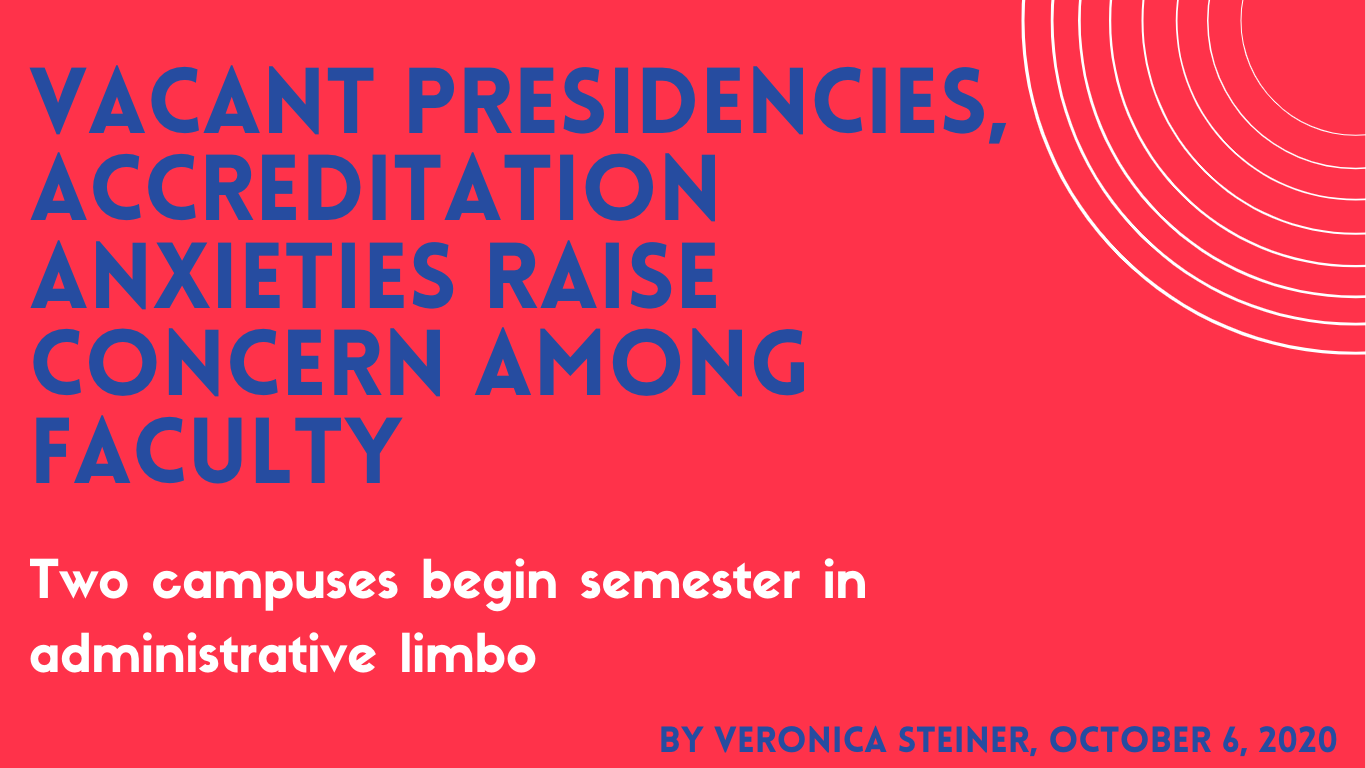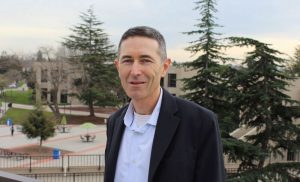
With the resignation of four college presidents and accreditation reports looming, filling the remaining two permanent president positions at Laney College and College of Alameda is a priority for the Peralta Community College District community.
“All the presidents were well-liked by the faculty and faculty were disappointed when they moved on, but for what it’s worth we see high level administrators are turning over faster and faster, not just at Peralta, but statewide,” said Matthew Goldstein, College of Alameda faculty senate president.
The executive resignations at Peralta began when Dr. Marie Elaine Burns left Merritt College in December 2019, followed by Berkeley City College President Rowena Tomaneng who resigned in March 2020 to become president at San Jose City College. Then, over the summer, Tim Karas resigned from College of Alameda to become President/Superintendent at Mendocino College and Tammeil Gilkerson left Laney College to lead San Jose Evergreen College.
Following the resignations, Angelica Garcia became president at Berkeley City College in May and David Johnson was permanently hired as president of Merritt College in June. However, the positions at Laney and College of Alameda are still in the process of being filled.

According to Laney Faculty Senate Vice President Leslie Blackie, administrative turnover is an important issue for the district, especially in the wake of the accreditation issues.
“One of the biggest concerns, and this has been true in previous accreditation cycles, is the administrators swirl, that we just don’t have administrators staying very long,” Blackie said.
“They benefit from transferring and moving around, and this is system wide. I would really like to see people come and be really committed to staying more than two or three years, because I think that’s really important. I think that would be a huge benefit in the accreditation issues.”
In January, the four colleges were placed on probation after the Accrediting Commission for Community and Junior Colleges, or ACCJC, said that “no evidence was provided that corrective actions are being implemented to address the noted deficiencies.” For a chance at getting off of “probation” status, the four colleges must submit a letter to ACCJC by Nov. 1.
Probation status is assigned if “an institution has been determined by the commission not to meet one or more standards, and there is a serious concern on the part of the commission regarding the level and/or scope of the noncompliance issues,” according to the ACCJC website.
Accreditation issues and high executive turnover are not new problems — a trend that California Community Colleges Chancellor Eloy Ortiz Oakley is watching closely.
Executive turnover was cited in Peralta’s June 2019 FCMAT report as an issue at the district. “While interim administration has been brought in, and much work has been done during their short tenure, the district has suffered from years of ineffective and inconsistent guidance, nonadherence to policies and procedures, and difficulties in receiving consistent information and communication,” the report reads.
“The leadership void has had a significant impact on the district’s fiscal health risk score, which is excessively high at 69.9 %.”
Since the FCMAT report, administrative turnover has persisted with the resignation of four presidents and former chancellor Regina Stanback Stroud.
Although the four most recent outgoing presidents didn’t give their reasons for seeking employment elsewhere, District Academic Senate President Donald Moore wonders if it was former Chancellor Regina Stanback Stroud’s leadership style that didn’t resonate with the departed presidents.

“You have to read between the lines. They all resigned,” Moore said.
“Without a doubt the Regina regime influenced that.”
Chancellor Stanback Stroud resigned in July via a letter addressed to the Peralta Board of Trustees, which listed a number of accusations against the board. During Stanback Stroud’s tenure, she was criticized by faculty who said her leadership style was oppressive and only served the administration’s interests, according to an April resolution from the Laney College Faculty Senate.
“I don’t want to speculate because I don’t have facts . . . but I do think there was tension and that’s not necessarily a great way to develop solutions,” Blackie said.
“I do feel that the previous chancellor came in and when she came in, I felt that there was a strong attitude that faculty were the problem . . . So if you look at someone and say you’re the problem, it’s difficult to get someone to buy into possible solutions. That’s something we really need to work on,” Blackie said.
Before her resignation, Stanback Stroud initiated a hiring process for the open president positions. Many faculty members, specifically at Laney, noticed the new process did not follow policy.
In a July 2020 letter to Interim Chancellor Carla Walter and the Board of Trustees, the Laney Faculty Senate highlighted a breach of the district’s Equal Employment Opportunity Plan and Human Resources Hiring Procedures, citing problems with the permanent president hiring process that included not advertising the positions according to Administrative Procedure, a rushed timeline and a lack of public forums for finalists.
Since the letter was sent, the hiring timeline has been extended and public forums were added so both students and faculty could be present and active in the hiring process.
Members of the district community are hoping that the incoming presidents will be leaders who not only help on the ground, but mitigate some of the challenges the colleges face with accreditation.

“The most important thing is for people who wish to become administrators in the district is to learn how to listen as well as propose new solutions — listen to the problems with an open mind,” Blackie said.
At College of Alameda, Faculty Senate President Matthew Goldstein hopes the new president will also focus on lower priority issues that affect faculty and students.
“I’m a pretty practical fellow. One thing I’d like to see in a president is attention to some pretty modest things around campus,” Goldstein said. “I want things to work; I want the water fountains to work, bathrooms to be clean, I want the faculty to have keys to the door to their offices, I want students to be able to park on campus . . . I’m pretty focused on concrete, low-level things.”
Upcoming forums at the campuses will allow members of the community to meet the president candidate finalists and give feedback to human resources.
“Part of the job of the president is based on personality, it is a political job, it is an educational leadership job. It is a job that involves a lot of relationship building with various constituencies on campus: faculty, staff, stationary engineers and custodians, the community, I guess the forum is an opportunity to see how the president’s public personality plays with all those different constituency groups,” Goldstein said.
College of Alameda’s president finalist forums will be held on Wednesday, Oct. 7 beginning at 11 a.m. You can view the schedule for the Zoom forums online.
Laney College’s president finalist forums will be held on Wednesday, Oct. 14 beginning at 10 a.m. A schedule has yet to be released.


























